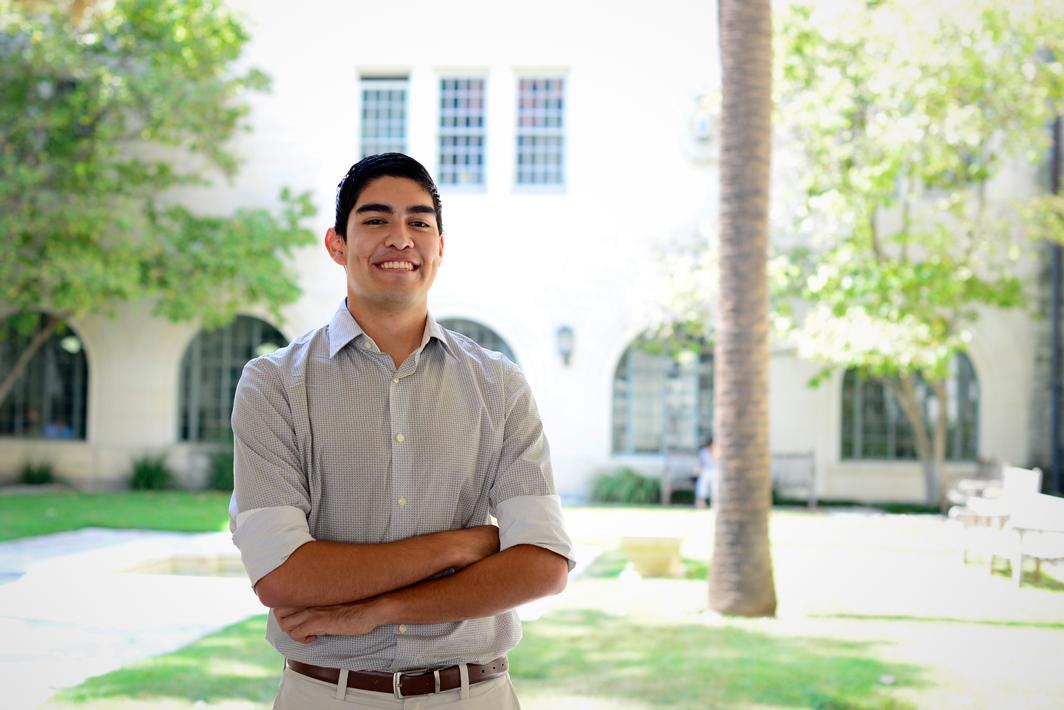When his peers began writing their college essays and taking their SATs, economics junior Ismael Castaneda didn’t even know where to start. Now over two years later, he’s dealing with the pressures of being both a first generation student and a community college transfer student at the University of Texas at Austin — all while guiding others through the same struggle.
Story by Kassidy Curry
Photos by Xintong Guo
Castaneda was born in Oakland but raised in Richmond, California. While living in California, Castaneda’s parents, both immigrants from Mexico, involved him and his siblings in their activism for issues in education and immigration. “I guess that’s why I care a lot about those issues now,” Castaneda says. His parents, worried about their children being surrounded by the gang activity and crime in Richmond, moved to Fort Worth, Texas in 2004.
In Fort Worth, Castaneda attended school in a wealthier district. It was a very different environment to Castaneda, who came from a poorly funded school district in Richmond. Despite the disparity, he excelled and was involved in the honors program in high school. When his classmates began preparing for college applications and the SAT, Castaneda didn’t have anyone to reach for help.
Both of his parents stopped attending school early in their lives to work to support their families. Though they encouraged Castaneda and his siblings to attend college, they were unable to guide them through the process. Castaneda felt that there was no outreach to students like him. Because he attended a school comprised of more privileged students, the majority of students around him already had a general idea of what they were doing and had their parents to help them through the preparation. “I didn’t know anything about college, about writing my essay, what my major would be,” Castaneda says. “Nobody in my family has had to be asked what their major will be.”
Though he got into Texas Christian University and the University of California, Davis, Castaneda didn’t have the money or full-ride scholarships to attend, and the idea of taking out loans overwhelmed both him and his parents. “It was a shock,” Castaneda says. “It was something like hitting a brick wall.” This was the moment when Castaneda felt he truly understood the difficulty he would face to get to college given his situation. But he wasn’t going to give up on his goals of higher education, and he instead applied to Tarrant County College in Fort Worth.
At TCC, Castaneda became an honors student and got involved around campus. He was elected president of the Texas Association of Mexican American College Students and joined the Men of Color Mentoring program. Because he was so involved, he became well known among TCC faculty. The president of his campus emailed him asking him to speak to faculty and staff about his experience as a first generation Latino student. During the rest of his time at TCC, Castaneda gave his testimonial at several conferences, including the Achieving the Dreams Summit in Arlington, Texas and the LULAC Emerge Latino Conference in Washington D.C.
In his talks, Castaneda uses his background to encourage others in similar situations, as well as to shine light on the struggle of identity and academic achievement in first generation students. “A lot of students aren’t encouraged to use [their identity] as a driving force — they’re encouraged to assimilate into a different culture,” Castaneda says. “A lot of students are left behind because we’re not addressing these issues.”
Castaneda struggled with these issues, but it didn’t stop him from his goals. He made an effort to reach out to other students who struggled with these same problems. Daniel Cruz, a fellow student at TCC, started attending the same youth group as Castaneda. Cruz would often see Castaneda around campus and was inspired by all of the work he got done. “Most of the time I would see him, he was always studying,” Cruz says. “He always had something to do.”
Cruz opened up to Castaneda about how he was feeling lost at school. He expressed his worries about being a freshman at TCC and not understanding what paths he needed to take to further his college career. Castaneda helped Cruz better understand the options that are available for community college students. Cruz also expressed his concerns about juggling work and school. Castaneda helped Cruz find a bilingual tutor work-study position so he could find an easier way to manage both. Cruz says the help Castaneda gave him has allowed him to help others in similar ways. “If I had not met him, I wouldn’t be the person I am,” Cruz says. “Just knowing the guy is inspiring.”
During his freshman year at TCC, Castaneda attended the Student Leadership Summit at UT hosted by Project M.A.L.E.S., a Latino mentorship program on campus. The program gave him a better perspective on UT and its diversity. This, along with being a top-tier research university, is what appealed to him most about UT.
During an awards ceremony for the Telemundo Hispanic Business Salute Scholarship, Castaneda heard a speech by Raul Magdaleno, a previous Jack Kent Cooke Foundation scholar. Intrigued, Castaneda looked into the program and applied for the Undergraduate Transfer Scholarship, which he received for his time at UT. Now that he’s enrolled at UT, he’s working with a graduate research assistant at Project M.A.L.E.S. to analyze the transition of community college students into four-year institutions.
Despite working through his own transition, Castaneda continues his efforts to mentor other students who need guidance. People often reach out to him because of his social media presence. He created a Facebook page over the summer called “Project Ismael” where he posts scholarship opportunities and deadlines to help other students.
Moises Ramirez is a TCC student who reached out to Castaneda after seeing him on Twitter. Before Ramirez even attended TCC, Castaneda introduced him to the staff as an incoming student, including the honors program which Ramirez later became a part of. Ramirez still seeks advice from Castaneda long-distance, and says talking to Castaneda helps him feel less stressed. “I do look up to him,” Ramirez says. “That’s what a good mentor is, somebody who can guide you to get where they are.”
Castaneda plans to research underprivileged students during his undergraduate years. After college, he wants to use that research to create an outreach program for students all over the country. His goal is to help them better understand college and higher education, while also keeping ties to and gaining strength from their background and their identity. Castaneda says this issue causes confusion for first generation students who don’t know whether to follow in the footsteps of their parents or to pursue their passion. “I want to use the research to outreach to students across the nation,” Castaneda says. “I want to help them with issues like what college is, what your identity is.”












































